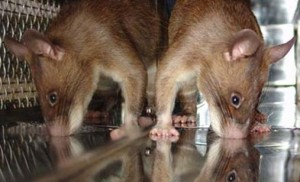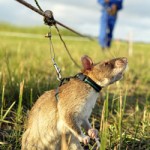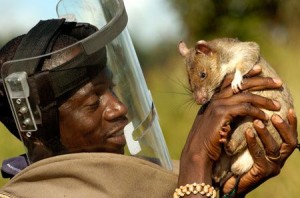True Heroes: African Pouched Rats Trained to Detect Landmines
All it takes is one more step, a resounding click for it to be your last. In Africa last year, 6000 people walked on landmines. Sadly, there was no way of knowing what was below the surface. A simple and sustainable solution for Africa’s real world problem has now been found. Bart Weetjens, a Buddhist monk, developed a program called APOPO (Anti-Personnel LandMines Detection Product Development). This program trains African Giant Pouched Rats, Cricetomys Gambianus, to detect landmines to save human lives.
Why rats?
It is true that dogs have already been trained to detect landmines; but, it costs five times more to train demining dogs than rats. This significant difference allows APOPO to use the remaining money to expand training programs. Also, like dogs, these animals are highly sociable with humans. However, unlike dogs, rats have more genetic material allotted to olfaction (sense of smell). They have an amazing capability to map smells and communicate them to us. In addition, African Giant Pouched Rats are a native species to sub-Saharan Africa, which allows them to be easily caught and trained. Additionally, they are smaller in size, thus they do not activate the landmines; whereas large dogs may be at risk. Furthermore, rats differ from dogs because they do not get emotionally attached to a specific trainer. This is important because it allows for multiple trainers to handle the rats.
The Training Begins
Around four weeks of age, the rats are weaned, handled by trainers, and exposed to many different surroundings. The purpose of this is to reduce the rats’ easily startled instincts to run and hide.
Training then proceeds by teaching the rats to recognize a specific clicking sound followed by a food reward. This process is known as Classical Conditioning Methodology. Once the rat automatically associates the click sound with the food reward (a mixture of peanuts and mashed bananas) they move on to the next stage of training.
Next, the rat is placed into a cage with a single hole in the bottom. Directly below this hole, a target sense is placed. The target sense consists of five drops of aqueous TNT, trinitrotoluene, solution. The rat’s goal is to learn to put its nose in the hole for five seconds until it can receive a food reward. Once this task is achieved, the rat moves on to the next level.
The subsequent step places the rat in a cage with ten holes, with only one containing the target sense. If the rat can continuously locate the target sense and hold its nose in the hole for five seconds, it can move on to conquer the next task.
As the undertakings get gradually more difficult, the rat usually accomplishes them more quickly. It must now face the job of learning to walk on a leash in the fields and find targets. They must learn to systematically move up and down on an axle and search the land. They are strapped to a harness and are gently directed in the correct direction by two trainers. Once this is accomplished they must discover real mines in real mine fields. The trainers know the rat has discovered a mine because they dig, bite and sniff at the ground for five consecutive seconds.
On average, it takes 252 days of training in the cages and fields to ready a rat for the final test.
The Test
Finally, once the rat has passed all its training stages, it is sent to The International Mine Action Standards. This test consists of 400 m² and 5-7 mines placed blindly under the surface. The team of trainer and rat must detect all the mines to get licensed and once this is accomplished the rat becomes an accreted animal to the operation in the field. If the rat fails this test, they must start their training again.
Currently, the rats are being trained in Morogoro and Tanzania. They are then shipped, along with their trainers, to Mozambique where more people are recruited to become trainers. For safety purposes, trainers are fully equipped with protective gear and two different rats always examine the same area to guarantee accuracy. Moreover, once the rats have indicated the same spot contains a mine, the area is further checked by a metal detector. The landmines are then disposed of by trained de-miners. In 2009 within nine months, APOPO’s team cleared 199,317 m² in Mozambique and discovered 75 landmines and 62 other explosive remnants of war. From this, 750 families were allowed to return to their land, to their home.
Already 11 African countries have adopted this skill. It allows them to be less dependent on foreign aid. In conclusion, these hero rats are saving many people’s lives. They empower vulnerable communities to tackle difficult and dangerous tasks at a feasible price.
Fun Fact:
Weetjens and APOPO have also trained rats to detect tuberculosis and they are in the process of training them to detect victims of earthquakes.
You Tube Video: HeroRAT being trained to sniff out landmines in Tanzania
Further Reading:
- APOPO’s Website
- Using Giant African Pouched Rats (Cricetomys Gambianus) To Detect Landmines – Research Article
- Giant rats put noses to work on Africa’s land mine epidemic – CNN article




October 17th, 2011 at 6:06 pm
It’d be really nice if these rats could in fact be trained as detectors for victims in earthquakes because that would increase the efficiency of rescuing the survivors before they die of thirst and/or pressure from the fallen objects.
October 20th, 2011 at 7:34 pm
I have to say that rats are amazing.
Really useful in many ways.
October 21st, 2011 at 2:07 pm
I was not prepared for these rats to be so adorable! They are the new perfect pet: small size, short hair (no shedding), AND they will sniff out mines for you! Where can I get one?!
Seriously though, this program is fantastic. It seems like such an unnecessary loss for innocent people to die from mines placed so long ago.
Animals can do a lot more for us than just be a friend or a dinner serving.
October 21st, 2011 at 9:17 pm
Such a great program for so many reasons. All it takes is an idea…
October 23rd, 2011 at 2:51 pm
The first thing I wondered with the title was do the rats ever die from the mines? So it’s nice to hear that these rats are small enough to not activate the land mines. This fact makes me support this new idea more than using trained dogs!
I personally related to this topic because of one of my childhood favorite books, “Not Mines, but flowers” (link). It is a picture book that raises awareness of land mines and asks for their removal.
You can also find someone reading this book on Youtube.
October 23rd, 2011 at 3:01 pm
Sorry here is the link to information on the book. http://web-japan.org/kidsweb/archives/news/98-6/sunny.html